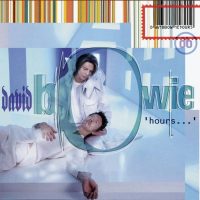 Recorded: 1998-1999
Recorded: 1998-1999
Producers: David Bowie, Reeves Gabrels
Released: 4 October 1999
Personnel
David Bowie: vocals, keyboards, guitar, drum programming
Reeves Gabrels: guitar, synthesizer, drum programming
Mark Plati: guitar, bass guitar, synthesizer, Mellotron, drum programming
Chris Haskett: guitar
Marcus Salisbury: bass guitar
Mike Levesque, Sterling Campbell: drums
Everett Bradley: percussion
Holly Palmer: vocals
Tracklisting
Contents
- ‘Thursday’s Child’
- ‘Something In The Air’
- ‘Survive’
- ‘If I’m Dreaming My Life’
- ‘Seven’
- ‘What’s Really Happening?’
- ‘The Pretty Things Are Going To Hell’
- ‘New Angels Of Promise’
- ‘Brilliant Adventure’
- ‘The Dreamers’
A step away from the experimental and often abrasive sounds of 1.Outside and Earthling, ‘hours…’ found David Bowie in a more contemplative mood – the comedown after the hedonistic night before.
It’s a more personal piece, but I hesitate to say it’s autobiographical. In a way, it self-evidently isn’t. I also hate to say it’s a ‘character’, so I have to be careful here. It is fiction. And the progenitor of this piece is obviously a man who is fairly disillusioned. He’s not a happy man. Whereas I am an incredibly happy man! So what I was trying to do, more than anything else, was capture some of the angst and feelings of… guys of my age. I’d say, broadly, it’s songs for my generation. People who’ve lived through the late ’60s, ’70s, and part of the ’80s… although the ’80s don’t really come into this album. It’s a long reach back, generally. I was trying to capture elements of how, often, one feels at this age.So it’s personal, but not some hybrid fantasy. There’s not much concept behind it. It’s really a bunch of songs, but I guess the one through-line is that they deal with a man looking back over his life.
Uncut, October 1999
In 1998 Bowie recorded ‘A Foggy Day In London Town’ for the charity album Red Hot + Rhapsody, and in August reunited with Tony Visconti to record the song ‘Safe’. This was the forerunner of their full-length collaborations on Heathen, Reality and beyond.
The phone call was a nervous one for both of us. David was trying to do a lot of catching up in a short time.‘I’m so happy to hear your voice after fourteen years David.’ My eyes welled up. I didn’t realize how much I missed him until that moment. I’m not sure what the silence was really all about except that we never spoke after I told him I wasn’t able to mix the sound for his Serious Moonlight Tour. It was all water under the bridge anyway and we made a date for coffee.
Bowie, Bolan and the Brooklyn Boy, David Buckley
Bowie also wrote a number of songs with guitarist Reeves Gabrels in Bermuda. The pair recorded a series of demos which set aside experimentation in favour of more conventional performances on guitar and keyboards. This work paved the way for ‘hours…’, David Bowie’s final album of the 20th century.
By the spring of 1998, David had become a resident of Bermuda. A change from Switzerland, but in some ways more isolated. Before long, I got the call: ‘Hey, why don’t you come over, hang out, watch movies, and write some songs?’ […]When I got to Bermuda, it was apparent that yes, David had lots of movies. But nothing to record on, plus his two acoustic guitars were in terrible playing shape due to island humidity. My workaround was to put them in alternate tunings. At first, we spent our daytimes with David surfing the internet and me across the room trying different tunings and searching for chord ideas and a harmonic mood that would move him to invent a melody. About once a day, kismet.
Within a week we had recorded five cool acoustic-based songs on a RadioShack microcassette recorder that was always in my shoulder bag. To this day, it amuses me that I have songs that I wrote with David Bowie that exist (with vocals) nowhere else but on a stack of microcassettes in a box because we never put those compositions on any record. It’s almost Duchamp.
I visited David at ‘Seaview’ in Bermuda several more times, bringing a small Korg 8-track recorder after that first outing. During one visit, David (between episodes of Lonesome Dove) said he felt his next album should be produced by him and me. (Which was the original plan for Earthling, but that changed, organically, during production.)
During those Bermuda visits, we wrote ‘The Pretty Things Are Going To Hell’ (I’d brought a sketch on the Korg) and started what would become ‘New Angels Of Promise’ (working title: ‘Big John’), plus ‘The Dreamers’ and several other songs.
Brilliant Adventure (1992-2001) book
Three songs recorded during the sessions were originally intended for Gabrels’ 1999 solo album Ulysses (Della Notte), while others were written recorded for the computer game Omikron: The Nomad Soul.
Because the album was taking a decidedly more introspective turn, it meant that I needed to approach the guitar playing in a different way in order to wrap around the vocals and support the mood of the song in the solos. As co-writer and co-producer I had to be extra careful that the guitar player in me was responding to the lyric content of the songs. The music for ‘We All Go Through’, ‘Survive’ and ‘The Pretty Things Are Going To Hell’ came from songs that I had started for my solo record. On the other hand, ‘Thursday’s Child’ and ‘The Dreamers’ were from keyboard/vocal ideas that David had had.
Strange Fascination, David Buckley
